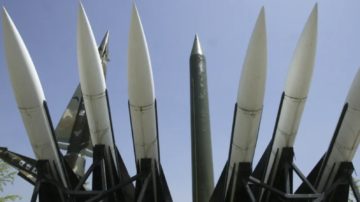Rachel Bronson and Sharon Squassoni in The Hill:
 Fears about President Trump’s unilateral access to nuclear launch codes in the remaining days of his troubled administration led Speaker Nancy Pelosi (D-Calif.) and others to call for limiting the President’s ability to authorize a nuclear strike. What may have seemed like political theater is in fact a serious and known gap in accountability that lawmakers and scholars have tried to address for decades without success.
Fears about President Trump’s unilateral access to nuclear launch codes in the remaining days of his troubled administration led Speaker Nancy Pelosi (D-Calif.) and others to call for limiting the President’s ability to authorize a nuclear strike. What may have seemed like political theater is in fact a serious and known gap in accountability that lawmakers and scholars have tried to address for decades without success.
Trump was not the first embattled U.S. leader whose access to the launch codes spooked Congress. President Nixon, who revealed to the press in 1985 that he considered using nuclear weapons on four occasions, reportedly told two congressmen in the summer of 1974 that “I can go back into my office and pick up the telephone and in 25 minutes 70 million people will be dead.” Concerns about Nixon’s heavy drinking and pressure from the impeachment proceedings are said to have led Defense Secretary James Schlesinger to instruct the Joint Chiefs of Staff that any emergency order coming from the president — such as a nuclear launch order — should go through him or Secretary of State Henry Kissinger first. But Schlesinger had no legal authority to intervene and it is not clear what would have happened if Nixon had ordered an attack.
Two years earlier, Senator J. William Fulbright sought to include an amendment to the landmark War Powers Resolution (which Nixon vetoed but Congress overrode) that would have required prior congressional authorization for nuclear weapons use except in response to a nuclear attack. The exception, presumably, was to cover the scenario of a surprise nuclear strike by the Soviet Union designed to disarm us. The amendment failed, but the conviction that the president needed full freedom of action lived on.
Today, there is less merit than ever to support unilateral authorization without consultation and many ways to structure a process that would still be flexible but accountable.
More here.
